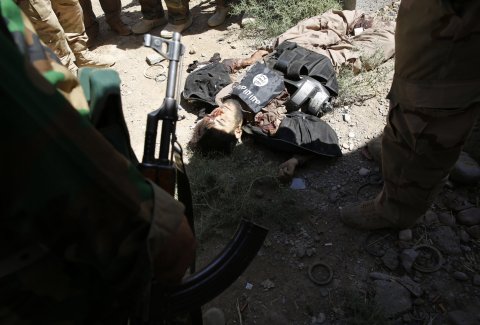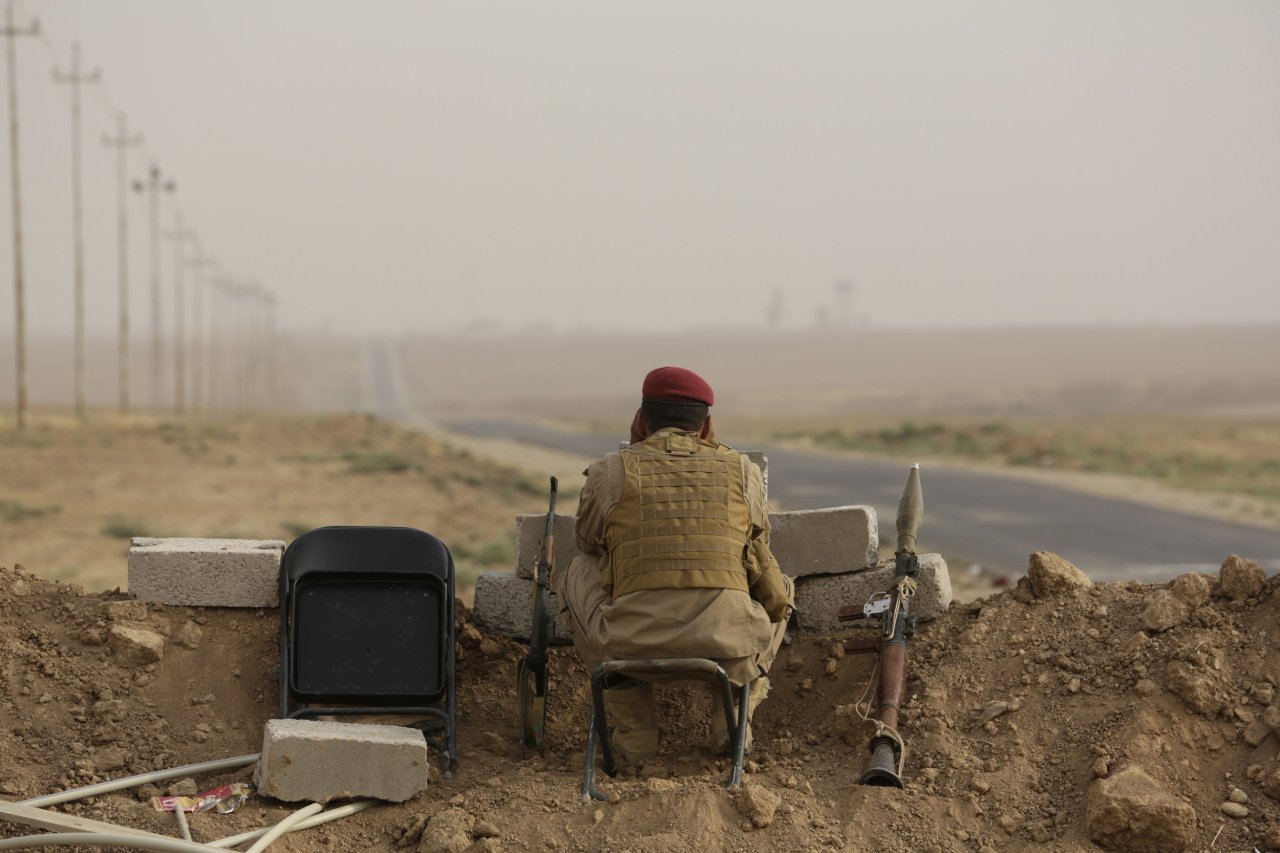The so-called Islamic State, better known as ISIS, is not just a collection of barbaric psychopaths willing to engage in the most brutal and sordid forms of violence without any hesitation born of normal human morality. They are also the most irreparably stupid jihadists ever to slaughter their way onto the international stage.
And therein lie not only the seeds of their ultimate destruction, but the reason America should not rush in to take on these thugs. It needs to wait and see how successful ISIS's many other enemies are in attacking it.
ISIS took advantage of weaknesses created by civil war in Syria and governing incompetence in Iraq to grab control of lands and establish itself as a credible force. But overrunning land by surprise or amid widespread chaos is easy. Think of it this way—knocking out Saddam Hussein in 2003 was a breeze for America and its allies. The real challenge was winning over supporters among Middle Eastern Muslims—something the United States failed to do, costing years of battle and death. And ISIS has already botched that crucial task.
To appreciate why requires an understanding of the adversary—something too many Americans, with their "I-don't-like-'em-bomb-'em!" mindset, dismiss as hooey. But, as any military strategist will tell you, the key to victory is getting inside the head of the enemy, not just running onto the battlefield in hopes shooting a lot of bad guys and blowing up a lot of buildings. If it were, the U.S. would have earned a decisive victory in Iraq a decade ago.
So, what is ISIS? It's a group of what is known as "Salafist jihadists" committed to what they see as the original meaning of the sacred texts of Islam, including the Quran. They combine that with a total commitment to violent jihad and a belief that the United States is greatest threat to their faith.
Let's keep count. Enemy No. 1: The United States (and its allies.)
This group is quite different from the larger group of Salafis who are simply adherents to strict interpretation of the Quran and other revered Islamic documents and don't pursue violence. Despite this wide agreement on religious beliefs, the Salafist jihadists consider other Salafis to be apostate Muslims who have turned away from God to appease Arab oil sheiks (which is why the jihadists call the other Salafis "sheikists.")
Enemy No. 2: The Salafis.
Enemy No. 3: The Arab oil sheiks.
The Salafist jihadists are also Sunnis whose conflicts with Shiites dates back centuries. As a result, they consider Shiites to be apostates and reject any form of Shiite rule. (The Shiites govern Iran and are the primary leaders in Iraq. Syrian President Bashar al-Assad is an Alawite, a mystical branch of Shiia Islam.)
Enemy No. 4: All Shiites.
Enemy No. 5: The government of Iran and its military.
Enemy No. 6: The government of Iraq and its military.
Enemy No. 7: The government of Syria and its military.

What should be obvious about this growing list is that Salafist jihadists consider almost all Muslims to be foes of true Islam. And they also have adopted a philosophy called tafir that poses danger to all of these Muslims, since under it these jihadists believe they have the right to declare any of them to be outside the true faith, thus allowing for their execution.
As anyone other than the most thickheaded of militants should know, murdering people is not the way to win friends, family and tribal compatriots. Osama bin Laden's Al-Qaeda—a terrorist group that is also Silafist jihadist—understood that fundamental point, and focused on enemy No. 1, America. Fundamentalist Muslims around the globe could nod their head happily at that; even the Iranians, despite being Shiias, could be quietly supportive.
But ISIS isn't that smart. Its slaughter-and-condemnation-fest has been indiscriminate in large part because it believes Islam must be cleansed before it can be successful in jihad. It's the fatally flawed logic of true believers. The problem, of course, is that all of the Muslims ISIS hates consider themselves to be legitimate—and sometimes the only true—practitioners of the faith.
Among those who must be taken out, according to ISIS? Other terrorist groups. It considers Hamas, the Sunni organization fighting in the Arab-Israeli conflict, to be traitors to the faith who must be removed or killed before any Islamic victory against Israel can be achieved. ISIS set off a car bomb in the Haret Hreik, Lebanon, a Beirut suburb that is a stronghold of the Shia terrorist group Hezbollah, and has since pledged to fight Hezbollah and its Lebanese supporters. They crucified (literally) eight Muslim rebels fighting with jihadists against the Syrian government for being too moderate. And one ISIS commander, a Tunisian named Abu Mus'ab, declared Ayman al-Zawahiri, the leader of Al-Qaeda—yes, even frigging Al-Qaeda!—to be an apostate.
Enemy No. 8: Hamas.
Enemy No. 9: Hezbollah.
Enemy No. 10: Al-Qaeda.
Because of that wanton hatred of so many practitioners of Islam, ISIS is considered by even other Sunnis to be false Muslims. Some Sunnis have identified the group's members as modern Kharijites—a sect that is neither Shia nor Sunni that in the seventh century refused to accept the leadership of the cousin of the Prophet Muhammad. (And in fact, there is something to this: ISIS has many of the violent and self-righteous traits of the Kharijites.) Others consider ISIS as being so counter to the interests of Muslims that they openly speculate it is a creation of Western governments; some even claimed Hillary Clinton boasted of creating ISIS in her book, Hard Choices. (Before the GOP starts putting together campaign ads touting this conspiracy, please note: She never said that—it was made up by Muslims to spur Arab opposition to ISIS.)
But for all of its "everyone but us is the enemy" foolishness, ISIS made one even more significant error: declaring that it was founding a global Islamic state known as a caliphate and naming its leader as the supreme religious and political ruler of this new sovereign nation. This might seem like a lot of nothing, but in doing so, ISIS's leaders have signaled to the entire Muslim world that every true practitioner of Islam, including the members of Al-Qaeda and all other terrorist groups, must swear allegiance to them in order to obey God. That's not an appealing idea to terrorist groups that have been around a lot longer than ISIS and who certainly don't want to be part of a group that is promising to kill them.
So, while it is true that ISIS is extremely well-armed and financed (cash it obtained in part by robbing other Muslims or forcing them to pay what amounts to protection money), a real analysis of the group requires an examination of its Muslim enemies. And, as should be apparent by now, there are a lot of them.
In addition to the ones already listed, there's the Lebanese Army, the Kurdistan Worker's Party, a Kurdish political and military organization, the Islamic Front, a group of seven rebel groups in Syria that are allied with Al-Qaeda and that have banded together in part to fight ISIS as well as the Free Syrian Army, an opposition group in composed of defected members of the government's armed forces.
And that doesn't even account for jihadists in other parts of the globe who are certain to chafe if ISIS gains more power. Take one important organization, Jemaah Islamiyah, an Islamist terror group in Southeast Asia. JI, as it is known, has played significant roles in jihadist attacks—it had links to 9/11 and was expected by Al-Qaeda military leaders to play a role in a strike against America in 2001. One of its chiefs hosted a 2000 meeting in Malaysia where both the 9/11 attack and the bombing of the USS Cole, an American war ship, were plotted by visiting Al-Qaeda members. JI was behind the brutal 2002 car-bombing of two nightclubs in Bali. In other words, these are bad guys. But they have been around for decades, fighting for goals that are at odds with those of ISIS. JI wants to establish a Daulah Islamiyah—a regional Islamic caliphate—in Southeast Asia, something it cannot do if ISIS heads a global caliphate.
ISIS, then, faces two major military threats: other terrorist groups and the possibility of a Sunni uprising in areas under its control, driven by popular revulsion among the Muslims that these jihadists consider traitors to Islam. The group faces enemies in all directions and eventually, no matter how many weapons it holds, no matter how much money it has, ISIS will fall when confronted by those terrorists or those Muslims.
Unless.
Unless politicians in the United States and allies in the West fall back on their traditional "Fire first, think later" approach to military planning. Consider for a moment: ISIS has suddenly begun decapitating Western journalists and placing the videos online for everyone to see. The target audience, of course, is the United States. ISIS says it is engaging in this barbarism to warn the Americans away, but even they aren't that stupid. The 9/11 attacks, as every terrorist knows, were intended to and succeeded in luring us into war—just as bin Laden hoped it would. He believed his Al-Qaeda fighters would defeat the American military and drive it from Saudi Arabia. Why would ISIS think that killing a few journalists would cause the United States to cower when slaughtering thousands did not?
Simple: They don't. As one terrorism expert told me, ISIS is hoping America will go too far in response, launch attacks that kill lots of innocent Muslims in an attempt to wipe out the jihadists. That would not destroy ISIS, but would derail the Islamic threat to the group. For no matter how hated ISIS is among the other jihadists and Middle Eastern Muslims, the United States is despised more. A new American strategic blunder on par with the Iraq War would distract ISIS's Islamic enemies and turn the battle, once again, toward the U.S. If ISIS is to survive, it needs America to strike out rashly and harshly against it.
All this sounds like three-dimensional chess and it is. Unfortunately, in a world of Twitter foreign policy analysis and cable news blathering, America is rarely able to handle more than checkers when trying to address global threats. Yes, ISIS is hoping to strike us with something, anything, and it has enough supporters in the United States that it may succeed in executing an attack on a soft target. But the purpose of such an assault will be to provoke a response, one that will, inadvertently, save ISIS from the threat of the billions of other Muslims who want nothing to do with the group.
So, remember this: Every time you hear some commentator say America should "do something," they are reading from the ISIS script. The U.S. can soften up ISIS with strategic bombing to aid the Islamic fighters taking them on. But it cannot beat them by rolling the Humvees back into Iraq or Syria. ISIS will be defeated by its own brutality against the people who might otherwise be their allies. In this case, the enemies of our enemies are truly our friends, at least for now.
ISIS will fall. It is inevitable. That is, unless the United States becomes the stupid one and gives them what they want.






























